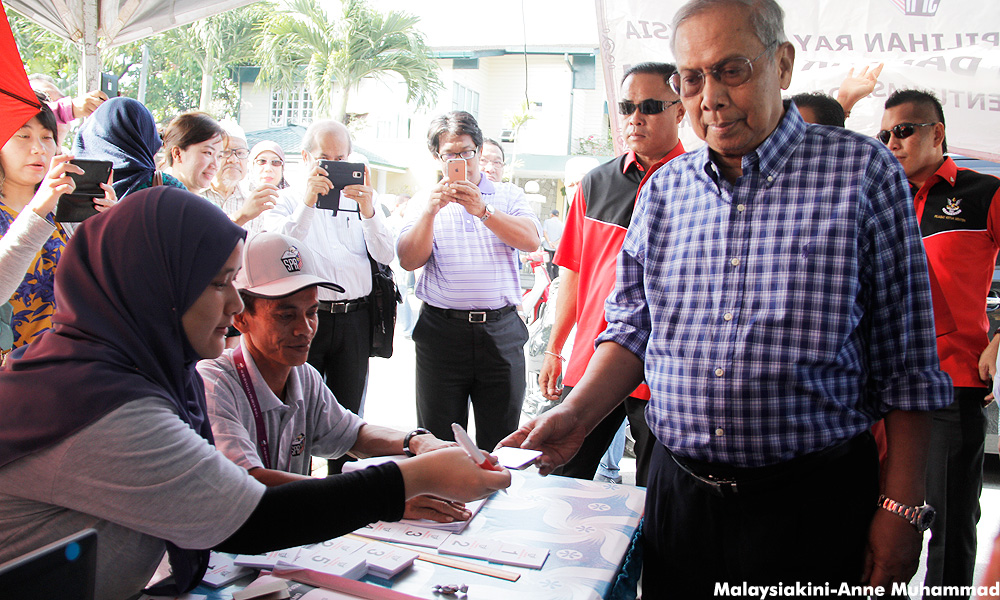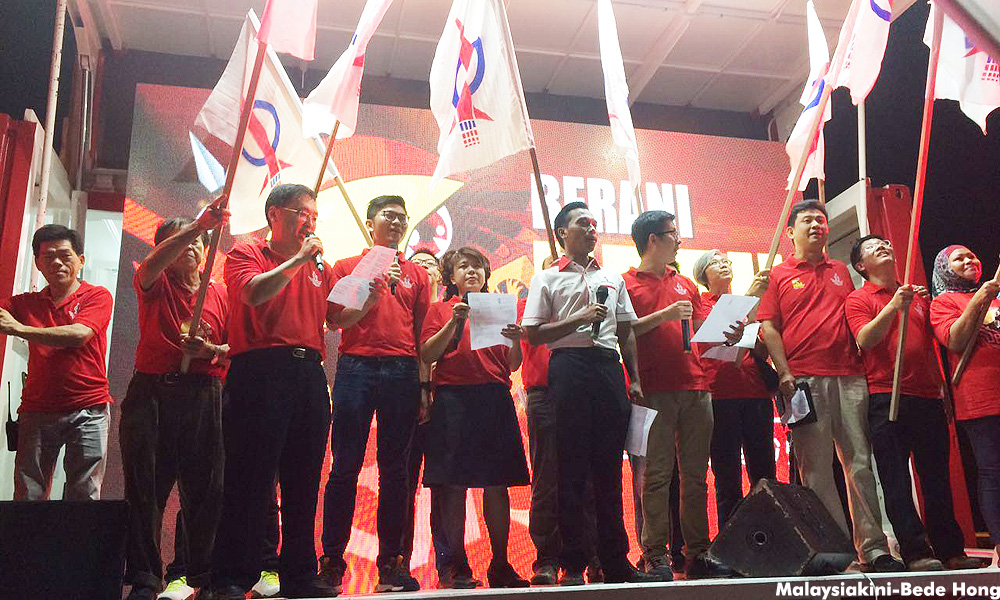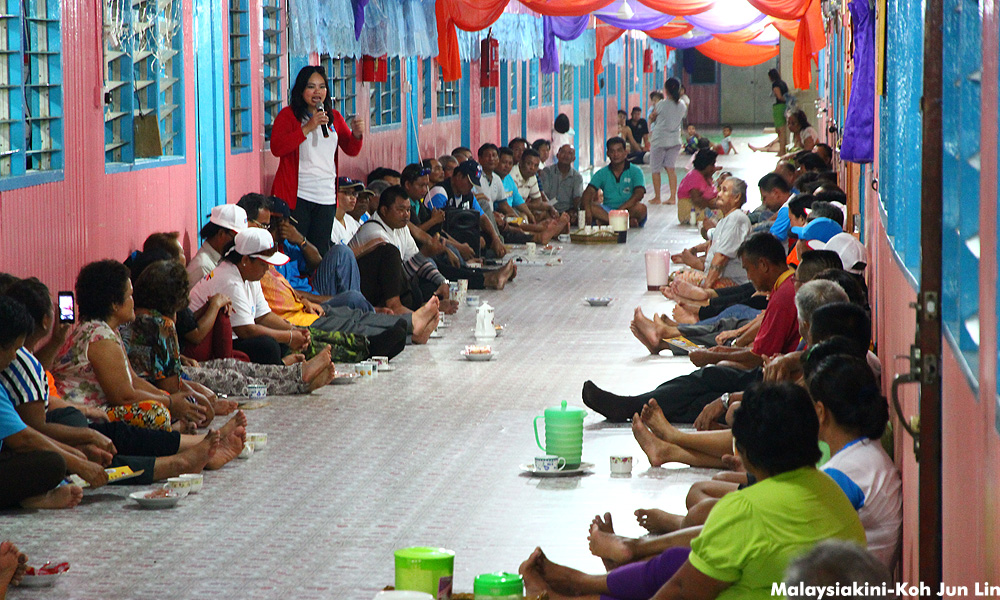ANALYSIS Sarawakian voters have started performing their constitutional rights, but it is still anybody's guess whether the BN and the opposition can successfully conquer each other's traditional fortresses, where there are 10 seats to watch.
This despite the popular believe of a landslide victory for the ruling party, and with that, the two-thirds majority in state legislative assembly.
The Pakatan Harapan has entered the game as an underdog as the 11 new state seats created out of redelineation exercise are mostly located in BN areas.
Pakatan has lost its shine compared to 2011 state polls, when they were riding on the alleged corruption scandals surrounding Abdul Taib Mahmud, the then chief minister who is now the governor.
 This time around, the popular chief minister Adenan Satem (photo) had said confidently that BN will take 70 seats out of 82. It lost 15 seats in 2011.
This time around, the popular chief minister Adenan Satem (photo) had said confidently that BN will take 70 seats out of 82. It lost 15 seats in 2011.
Already, Adenan's team won two seats uncontested on April 25 nomination day.
Judging from the two-week campaign, it is expected that the opposition will keep most of its stronghold urban seats while the rural hinterland will continue to be controlled by BN.
The opposition won 13 urban and semi-urban Chinese-majority seats and two rural Dayak-majority seats in the last elections.
Both BN and the opposition are determined to step out of their comfort zone with aim to pierce through their rival's stronghold seats.
According to political scientist Bridget Welsh, there are 30 rural seats, 38 semi-rural and 14 urban seats in Sarawak. Semi-rural seats will increase over time.
The opposition is aiming for the semi-rural areas - Tasik Biru and Bukit Semuja - where the voters have access to information.
They are aiming to take rural seats under Baram parliamentary constituencies, where the locals have been troubled by issues on dams and have emerged to fight for their own rights.
All out on Chinese-majority urban seats
In the meantime, BN goes all out on Chinese-majority urban seats like Batu Kawah, Dudong, Repok, Piasau and Pujut, traditionally stronghold seats of SUPP, until the 2011 state polls.
 The hot seats won by slim majorities are Telang Usan (845 majority votes), Batu Kawah (543 majority votes) and Dudong (317 majority votes).
The hot seats won by slim majorities are Telang Usan (845 majority votes), Batu Kawah (543 majority votes) and Dudong (317 majority votes).
Meanwhile, the element of sabotage in BN parties and BN direct candidates will play a significant role in Marudi, a state seat under Baram which almost fell to PKR by a slim majority of 194 votes.
In Bukit Semuja, BN direct candidate John Ilus is challenged by independent candidate Frederick Bayoi Manggie, a former PBB leader and five-term state assemblyperson.
Similarly, clashes between DAP and PKR may give an easy victory to BN candidate Lo Khere Chiang in Batu Kitang.
For all their efforts, it would be meaningful for both divide to make a breakthrough, even only by winning a few seats.
Adenan, who is leading Sarawak BN in state polls for the first time, will need to win badly to prove that he is capable of delivering what he promised.
The battle is equally important for the embattled Prime Minister Najib Abdul Razak who will want the swing of Chinese and urban voters back to BN, so that the ruling party can get rid of the label of "kampung champion".
 On the other hand, the opposition need the Dayak seats to show that they are capable of penetrating the rural areas, particularly in the Borneo state which is regarded as BN's fixed deposit.
On the other hand, the opposition need the Dayak seats to show that they are capable of penetrating the rural areas, particularly in the Borneo state which is regarded as BN's fixed deposit.
DAP only began to pick up its momentum in the middle of the campaign, where thousands turned up at ceramah. It has prompted the party to predict that it may lose half of its seats, a strategy to boost the turnout rate on the polling day.
The outstation voters, who are perceived as opposition supporters, may not come back as the polling day sits nicely between Ching Ming and Gawai festivals.
However, they appealed to these voters to return home for Mother's Day which falls on Sunday.
Election handouts, promises of development
BN wooed the voters with hundred of millions of election handouts and promises of development, which courted controversy.
Riding on Adenan factor, some BN candidates rarely talked about their political views.
Adenan, the super campaigner for BN, played the racial card, giving different messages to each ethnic groups.
He distanced himself from his predecessor and lured the Chinese with the promise of a deputy chief minister post.
While he urged the bumiputera to stay united and vote for BN when the Chinese votes are divided.
The opposition, which continuously harped on the 1MDB fiasco, Najib's scandals and the goods and services tax (GST), found many of their heavyweight speakers barred from entering the state.
Despite having visited the Borneo state over 50 times and instructed his whole cabinet to campaign, Najib chose not to enter the urban areas where voters are familiar with national issues.
Whether Najib's factor can write-off Adenan's factor, it will be known tonight.

